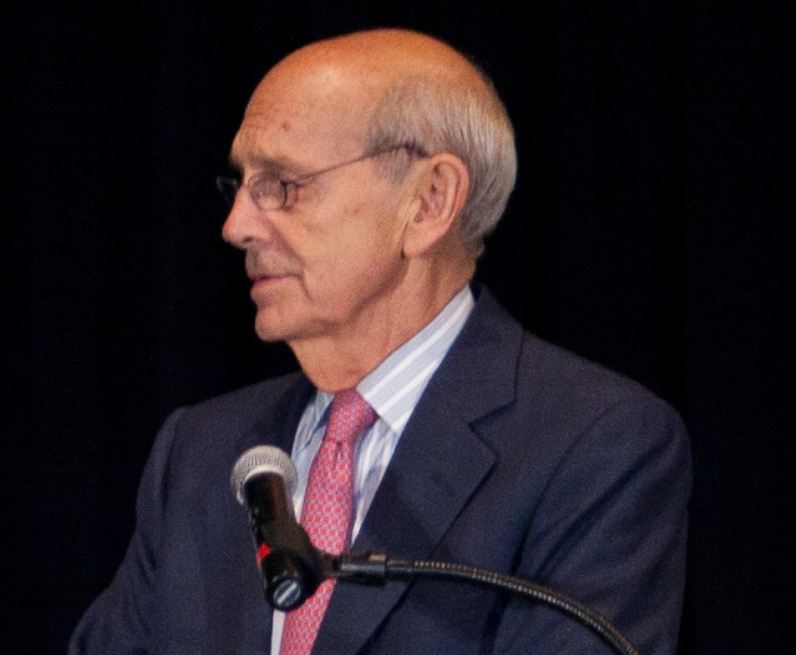
- Details
- By Levi Rickert
Justice Stephen Breyer, 83, was joined by President Joe Biden on Thursday as he announced his retirement from the U.S. Supreme Court in the White House’s Roosevelt Room.
"I think he’s a model public servant in a time of great division in this country. Justice Breyer has been everything his country could have asked of him," President Biden said during the announcement ceremony.
Turtle Talk's editor Matthew Fletcher (Grand Traverse Band of Ottawa and Chippewa Indians), professor at Michigan State University's College of Law, writes "...Breyer was no tribal sovereignty warrior ala Sotomayor, but he was no Indian fighter, either. He was part of the Rehnquist Court Nine that stayed together more than a decade. And, as such, he was also a part of a Rehnquist Court that showed nothing but contempt for tribal interests in the 1990s and 2000s. Justice Breyer’s voting patters are striking for one reason only — he rarely dissented from the Court’s majority in the Indian law docket. He seems to have gone with the flow."
Want more Native News? Get the free daily newsletter today.
Breyer’s retirement allows President Biden to nominate the justice’s replacement. It will be the first nomination to the Supreme Court by Biden, who has nominated more persons of color to the federal bench than any president in history in his first year in office. On Thursday, Biden said he intends to nominate a Black woman to serve on Supreme Court, fulfilling a campaign promise he made during a South Carolina primary debate in 2020.
The president’s nominee needs to be approved by the U.S. Senate. Given the partisanship in the nation’s capital, the 50-50 split Senate may require Vice President Kamala Harris to cast the deciding vote if the president can get all 50 Democratic senators to agree with his choice.
Breyer will leave the nation’s highest court once his replacement is confirmed by the U.S. Senate.
Breyer was nominated to serve in the U.S. Supreme Court in 1994 by President Bill Clinton.During his retirement announcement on Thursday, Breyer talked about the complexity of America.
“There are more than 330 million people. And my mother used to say it’s every race, it’s every religion … and it’s every point of view possible,” Breyer said. “And it’s a kind of miracle when you sit there and see all those people in front of you — people that are so different in what they think — and yet they’ve decided to help solve their major differences under law.”
Breyer’s retirement was announced shortly before noon on Wednesday by NBC News. The White House would not formally respond to questions relating to the retirement until Breyer personally made the announcement.
He did so today at the White House.
More Stories Like This
Native News Weekly (August 25, 2024): D.C. BriefsNavajo Nation Mourns the Passing of Former Vice President Rex Lee Jim
Deb Haaland Earns Endorsement From Communications Workers of America Local 7076
University Soccer Standout Leads by Example
Two Native Americans Named to Democratic Congressional Campaign Committee's“Red to Blue” Program
Help us defend tribal sovereignty.
At Native News Online, our mission is rooted in telling the stories that strengthen sovereignty and uplift Indigenous voices — not just at year’s end, but every single day.
Because of your generosity last year, we were able to keep our reporters on the ground in tribal communities, at national gatherings and in the halls of Congress — covering the issues that matter most to Indian Country: sovereignty, culture, education, health and economic opportunity.
That support sustained us through a tough year in 2025. Now, as we look to the year ahead, we need your help right now to ensure warrior journalism remains strong — reporting that defends tribal sovereignty, amplifies Native truth, and holds power accountable.
 The stakes couldn't be higher. Your support keeps Native voices heard, Native stories told and Native sovereignty defended.
The stakes couldn't be higher. Your support keeps Native voices heard, Native stories told and Native sovereignty defended.
Stand with Warrior Journalism today.
Levi Rickert (Potawatomi), Editor & Publisher

